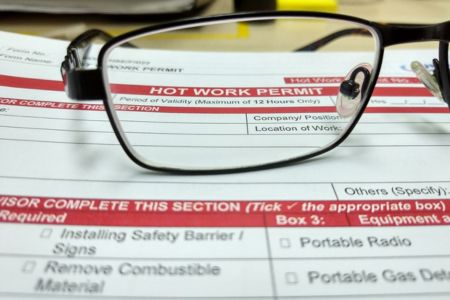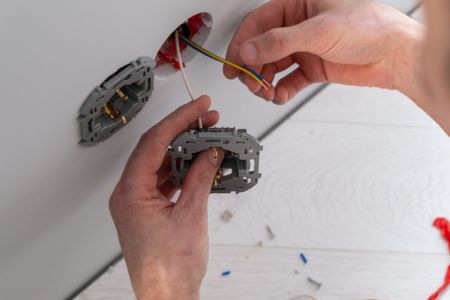When your home needs electrical work done, you may hesitate between choosing to hire an electrician or a general contractor (GC) to do the job. In addition to ensuring you get the high quality of work you expect, it's also important to consider who can do the work legally and safely. The following guide will help you understand the role of a general contractor In Florida, especially in areas like Tampa, Brandon, and Riverview and the legal regulations they must meet. You'll also learn about other considerations you'll face as a homeowner when hiring professionals to work on your property.
Table of Contents
First, it’s essential to ask, “What does a general contractor do?” At the core of their work, a general contractor manages a construction project from start to finish. Whether they take on new construction or remodeling projects, they ensure the project goes smoothly and safely, all while adhering to a budget and timetable. That might raise the question, “Can a general contractor do electrical work?” And for that matter, can a general contractor do electrical work in Florida, specifically?
The answer is that GCs usually do not perform electrical work themselves and instead hire electricians to take over that aspect of the project. The GC oversees all work performed by electricians and other subcontractors, like plumbers and HVAC technicians.
In a construction project, a GC fills many roles and works with various professionals, including attorneys, architects, skilled tradesmen, and property owners. From designing and planning the project to overseeing the construction, they stay involved in ensuring it has the required Hillsborough County permits and reviewing the plans to verify that the construction will follow building codes.
A GC will use their knowledge of construction practices to manage the project, but they don't work in areas that require specialized training. They may need to learn how to install electrical wiring or outlets, but they only know what wiring and electrical components are generally needed for the project.
For instance, if you were to ask, “Can a general contractor do underground work in Florida?” the answer would be that while any GC can perform basic excavations, they will need an Underground Utility and Excavation Contractor license to perform the electrical installation.
Complying with the needs set out by the general contractor, electrical work requires the knowledge and skill of a licensed electrical contractor. They will know how to work safely with electricity, as well as how to install equipment that not only meets the property owner's needs but complies with building codes.

An electrician's certification ensures that the person performing the work knows how to handle and properly install the equipment safely. Otherwise, poor installation or improper equipment can lead to electrical arcs, electrocution, and property fires in the future.
Every electrician must have a certified electrical contractor license to work in Florida. The Florida Department of Business and Professional Regulation issues these licenses when applicants meet the following criteria:
These requirements ensure electricians have the practical skills to work safely in their trade. The financial conditions, in particular, verify that the individual has the business acumen and resources to meet their financial obligations.
In addition, journeymen and master electricians must maintain their licenses. Florida doesn't have a statewide program regulating these licenses, so checking an electrician's license goes through the city government. Each city issues licenses through the Construction Trades Qualifying Board, and your electrical contractor may have additional certifications.
These accreditations are necessary because they demonstrate the contractor's skills and knowledge. Verifying certifications is an excellent way to ensure an electrician has the specific skills you require for your project.
What can a general contractor not do in Florida? A GC can perform essential construction work, including planning and design. However, they must use licensed and certified subcontractors for specialized work.
Even when hiring an electrician, the GC is responsible for obtaining the proper work permits. They must review construction permit requirements to ensure all documentation is correct. Typically, doing so involves submitting project plans, the electrician's credentials, and an application. The building department will review the application and approve or deny the permit. The permit approval process can take a few days up to several weeks.
The work must also undergo electrical inspections. The city sends an inspector to review the completed electrical work. If the work meets the necessary building codes, the inspection will pass. If there’s a problem with the work, the inspector will provide a list of corrections the electrician must complete before the GC can apply for a new inspection.
Returning to the question of “Can general contractors do electrical work?” the answer will depend on the specific GC you want to hire. You can use the same company for electrical work if the GC has its electricians on staff.
Before you decide to use a GC for electrical work, though, review the risks and benefits of the option below:
The disadvantages that come with this choice include the following:
A GC may need to learn all the best safety practices in handling electrical equipment, which will likely increase the risk of worker injuries and poor or unsafe installation work. If you hire a GC for electrical work, verify that their insurance is valid to avoid liability claims.
Another concern is legal compliance. While a GC knows the building codes related to general construction, they might need to become more familiar with codes that regulate electrical work. If the work doesn't meet the proper codes, you can be subject to fines and penalties, and you may also have to hire another electrician to correct the work.
A certified electrician knows what's involved in installing electrical equipment that provides safe energy usage. A GC, however, won't have that intricate knowledge. If a poor installation leads to electrocution or a property fire, the injured parties might sue you as the property owner. Such incidents are far less likely to occur when you hire an experienced and certified electrician.
Though there are serious disadvantages to consider, hiring a general contractor for electrical work also comes with its fair share of benefits, such as:
One of the most tempting advantages of hiring a general contractor for electrical work is the convenience. You'll work with one company as you plan and execute your project plans, which can effectively reduce delays and simplify communications.
Working with a GC for electrical work might save you money on your project in the long run. So long as the GC has the qualifications for your project, you might reduce your labor costs.

You should only hire contractors after researching them beforehand. Remember, every industry has some unlicensed and fraudulent individuals, so your due diligence will pay off.
Your research should consist of the following measures:
Your first step should involve checking the contractor's license. The Florida Department of Business and Professional Regulation website allows you to search for any contractor by name and verify that their license is valid.
In addition to checking the status of the contractor's license, the same website will list complaints against the contractor. Read through any complaints that might be there to learn more about the experiences of past customers.
It's also a good idea to contact the contractor's insurance company to ensure the coverage is valid and up-to-date. Never hire a contractor with lapsed insurance, as doing so can result in liability issues.
When considering a contractor, make sure to ask for references. Do not assume the references will verify the contractor's qualifications. It's not uncommon for a fraudulent contractor to provide false references in the hopes that potential customers won't call them.
You must always take the steps necessary to ensure your project will pass electrical maintenance and safety inspections. Beyond checking the electrician's credentials, communication is a vital part of the process. Observe the work and ask the contractor about specific safety and compliance points, such as:
Ensure your electrician has the appropriate gear. At a minimum, they should have rubber gloves, safety glasses, and flame-retardant clothes. The proper attire will keep them safe from electrocution and potential fires.
Watch how the electrician works. You should see them de-energize circuits before working with them. For added safety, they should use lockout/tagout procedures and ground their tools before use.
Ask the electrician about safety code compliance. They should be able to explain how their work meets the National Electrical Code (NEC) standards.
Develop a communicative relationship with your contractor and share your safety concerns. Your contractor should be happy to answer any questions you may have.
The permit process for electrical work requires a final inspection, which verifies that the work meets building safety codes. Request a copy of the report and review it yourself. If the job fails the initial inspection, keep up with the process. Observe the modifications the electrician makes to pass a second inspection. And when it's time for the final inspection, request a copy of that report as well.
Brandon Electric is proud to provide a full range of electrical services to homeowners throughout Florida. We're dedicated to helping our customers use energy safely and efficiently, and you can trust our certified technicians to handle the electrical work for any project you're planning. Contact us today to discuss your electrical needs.
Florida State Certified Electrical Contractor — License LIC #EC0002579
Serving Tampa, Brandon, Riverview & Hillsborough County for 25+ years
Same-day service availability